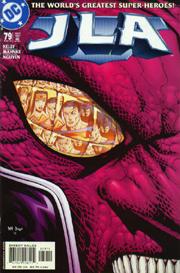"A government
must make difficult decisions, especially in times of conflict…
But it must never forget that its people bear the weight of
its choices.
We do not have to become monsters to defeat monsters…not even
in war."
It may be a little easier for Superman to say that sort
of thing when lecturing a bunch of aliens drawn by the excellent
Doug Mahnke. In the real world, Iraqi citizens are told by
their government that our marines qualify for duty by eating
a baby. We don't have to become monsters; our enemies are
doing the job for us.
So does JLA #79 have resonance? Some, and there's
no need to consider Joe Kelly especially prophetic for timing
this book the same week we finally went into Iraq. Anybody
with half a brain could see this war as inevitable months
ago. (Whether you consider that a good thing or a bad thing
is up to you…)
The World's Greatest Super-Heroes have suffered a slight
ideological schism, with some of the team all for being proactive
in spreading justice to another star system. Batman, of course,
hold a more down to Earth view. He and Firestorm, The Atom,
and The Flash watch as the rest of the team battles to find
a peaceful resolution to an interplanetary conflict.
To make things just a little more difficult for the JLA,
they find themselves in an uneasy alliance with old enemy
Kanjar Ro. Should a diplomatic team of Wonder Woman, Faith,
and Green Lantern fail against The Collective, Kanjar gets
to try things his way.
Of course things don't go well. The Mussolini-esque leader
of The Collective calls Wonder Woman a whore, but his further
words do carry a certain sting. "Who cares for the Kylaq after
you 'keep the peace?'" he asks through bloated lips.
It's a question worth asking, and because this is a comic
book, the answer Kelly offers may be a bit too simplistic,
more fitting to an episode of Superfriends. (But hey,
that's why we've got Apache Chief.) You can hear the cheesy
horn section coming up behind Superman's speech.
Even so, #79 provides a lot of food for thought about war,
politics, and the role of peacekeepers.
The book also has plenty of action, with Faith and Major
Disaster coming into their own. The mysterious Faith proves
herself to be more powerful than previously imagined, and
in the background the subplot of her origins looks to be building.
As for the Major, he seems to be filling the gap long left
by Guy Gardner, sort of a blue-collar hero with destructive
abilities. He does seem to be enjoying his own reformation,
and it would be cool to see it stick.
Kelly hasn't forgotten about his "lost" cast, either. We
catch a glimpse of the Martian Manhunter's journey. No sightings
of Plastic Man yet, but one can hope.
I know that comic books are not the real world. And maybe
the morality they offer just won't work in practical application.
But when Kanjar Ro tortures a captive in order to get crucial
intelligence less than two months after pundits debated whether
or not the U.S. should be using torture, I can't help but
hope that we remember to be better than that.
Rating: 






